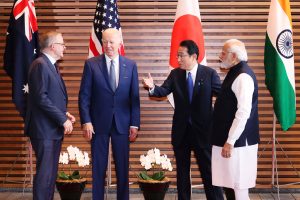Rajeswari Pillai Rajagopalan

The leaders of the Quad just completed their fourth meeting, and the second in-person gathering, in Tokyo. That the Quad leaders have managed to hold four summits in the last year speaks clearly to the strong commitment shown by the four countries to the grouping. Remarkably, new Australian Prime Minister Anthony Albanese had barely taken his oath of office before traveling to Japan for the Quad Summit, demonstrating the continued Australian commitment to the Quad despite the Labor Party coming to power in Canberra after nearly a decade of Coalition rule.
The resulting joint statement after the meeting highlighted the importance of the Quad as a “force for good,” with a positive agenda to make the Indo-Pacific region more resilient in the face of myriad challenges.
The Ukraine conflict figured prominently in the Quad leaders’ discussions despite the fact that India stands out among them in not calling out Russia by name or joining the Quad countries in sanctioning Moscow. Nevertheless, the joint statement emphasized the importance of rule of law, sovereignty, and territorial integrity; peaceful settlement of disputes without threat or use of force; and freedom of navigation and overflight. The leaders reaffirmed their determination to “uphold the international rules-based order where countries are free from all forms of military, economic and political coercion,” which is particularly applicable in the Indo-Pacific. The leaders also noted that what happened in Ukraine should not be allowed to happen in the Indo-Pacific. Thus, indirectly at least, New Delhi did demonstrate its unhappiness with Moscow’s war.
The connection between what was happening in Europe and the emerging confrontation in the Indo-Pacific was also made abundantly clear when a joint Russian-Chinese force of bombers decided to do a fly-past near Japanese territory during the summit.
The Quad countries also recognized the important role of maritime domain awareness (MDA) in order to be able to respond to a number of challenges, including natural disasters and illegal fishing. The new Indo-Pacific Partnership for Maritime Domain Awareness (IPMDA) is useful in this regard, but its relevance to monitoring China’s naval activities is especially significant. The joint statement noted that the IPMDA will “support and work in consultation with Indo-Pacific nations and regional information fusion centers in the Indian Ocean, Southeast Asia, and the Pacific Islands by providing technology and training to support enhanced, shared maritime domain awareness to promote stability and prosperity in our seas and oceans.” This is truly bringing the varied capabilities of the Quad together to help the entire region deal with a particularly insidious form of Chinese aggression: Beijing’s strategy of sending seemingly civilian fishing vessels to act as an extension of the PLA Navy in the maritime domains of various countries. This Quad initiative was much needed and should help the region recognize China’s covert aggression.
Maritime security and compliance with international law, especially the U.N. Convention on the Law of the Sea (UNCLOS), plus maintenance of freedom of navigation and overflight in order to maintain a maritime rules-based order, including in the East and South China Seas, were big on the Quad agenda. The leaders reaffirmed their opposition to “any coercive, provocative or unilateral actions that seek to change the status quo and increase tensions in the area, such as the militarization of disputed features, the dangerous use of coast guard vessels and maritime militia, and efforts to disrupt other countries’ offshore resource exploitation activities.” It would definitely help if the United States, the key Quad power, also joined UNCLOS, of course.
The Quad leaders also emphasized the importance of Humanitarian Assistance and Disaster Relief (HADR), which is demonstrated in the establishment of the “Quad Partnership on Humanitarian Assistance and Disaster Relief (HADR) in the Indo-Pacific.” This is particularly important given that the region is prone to natural disasters of increasing severity. The Quad, in its first iteration, took shape in the aftermath of the 2004 tsunami that struck the Indian Ocean region. Working with the Pacific Island nations in strengthening their economic well-being, health infrastructure, environmental resilience, and maritime security capabilities also figured prominently in the Quad joint statement.
Critical and emerging technologies, as well as space, featured prominently in the joint statement too, with the four countries agreeing to explore ways to share space-based Earth observation data, along with a “Quad Satellite Data Portal” that would aggregate links between the national satellite data generated by the Quad partners.
Despite the advances that the Quad is making in working together, their recent focus on non-traditional security issues — presumably at New Delhi’s insistence, considering the other three are already deeply intertwined security partners — is potentially troublesome. Admittedly, some of these are thinly-veiled security cooperation, or could quickly be escalated to security cooperation, but the reluctance to move further on direct security cooperation is difficult to understand. Hopefully, that will be next step for the Quad.
No comments:
Post a Comment